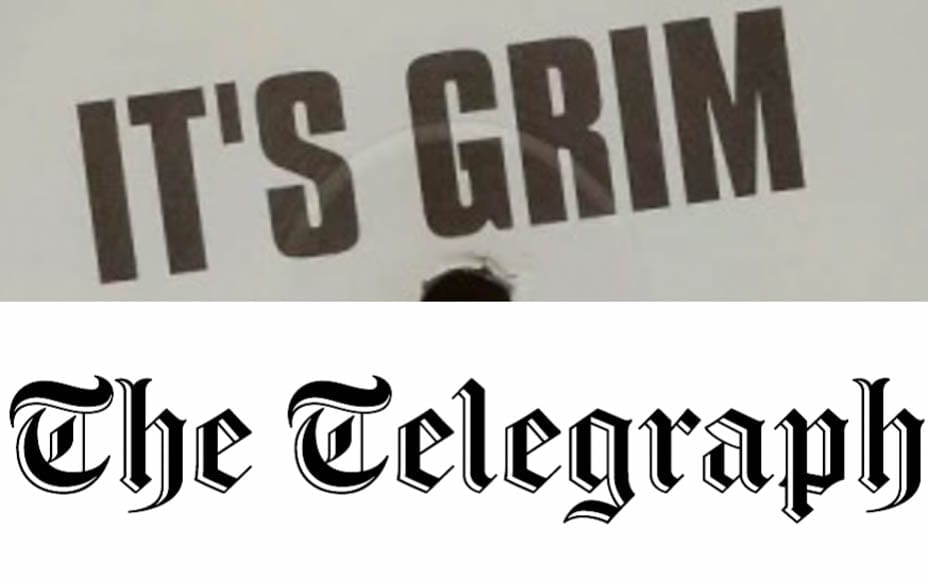Matthew Steeples analyses ‘The Telegraph’s’ decline and laments its likely future in the land of bubblegum journalism and fluff
It’s Grim Up North was a 1991 single by The JAMs. It referenced the “drab,” the “dreary” and “greyness” and even attracted homages, based upon other areas of Britain, such as 1992’s It’s Weird Out West.
Now, one could argue, The Telegraph – a paper so ably and intelligently edited successively by Bill Deedes, Max Hastings and Charles Moore in the period from 1974 to 2003 – has found itself stranded in the territory of grimness. This once “reliable” and “trustworthy” broadsheet – a paper that was lauded for so long as “one of the world’s great titles” and one that has the motto: “Was, is, and will be” – has lost its way and seen both revenue and circulation significantly diminish.
Profits at Telegraph Media Group decreased from £16.3 million in 2017 to just £900,000 last year and despite the Barclay Brothers having paid £665 million for the company in 2004, they are now allegedly considering approaches for it at around the £100 million mark. Given that sum was mentioned several months ago and no sale has yet progressed, many reckon they’ll struggle to get even that.
In spite of its readership (and thus thereafter resources) being down from 1.4 million daily in 1980 to just 281,025 as of December 2018, here is a paper that still until recently had the ability and courage to go after great scoops. A case in point was its brilliantly thorough investigation into the MPs expenses scandal – and rightly, for that, The Telegraph was named 2009 British Newspaper of the Year.
Sadly, more recently, such fine journalism has been replaced by the bland and the banal and the tawdry and the tacky. Yesterday, as an example, a prominent feature on the frankly also idiotically paywalled Telegraph site (which hardly anybody actually pays for) was titled “Meet FOBO (Fear of Better Options): the spoiled lovechild of FOMO and social-climbing.”
Penned by one Lisa Williams – a woman whose other recent pearls of wisdom for the paper have included “6 ways to boost your sex life this autumn,” “How to get out of a Wanderlust-style sex drought (without having sex with other people)” and “Forget the Danish and the Dutch way – here’s how to parent like a Brit” – here is a feature about “our choice-rich commitment-poor approach to socialising.” It is something that belongs not in a once distinguished newspaper founded in 1865, but instead in the advice pages of Heat or Closer.
Alongside an analysis of ‘FOMO’ and ‘FOBO’ since they allegedly “matter because it hurts to be the collateral to someone else’s FOBO” (whatever that may mean), Williams lists twenty “do and don’ts” for “hosting a modern dinner party.” Amongst other commands, this harridan patronisingly tells Telegraph readers – whom used to be generalised as ladies with blue rinses and ageing colonels living in the shires – is to “have a playlist of Wham! and Beyoncé ready.” She suggests “serv[ing] meat and two veg” to be wrong and to go for “individual chicken breasts” to be criminal. Amongst other gibberish that she plainly aims at millennials – who anyone with half a brain would know will instead be busy elsewhere on their Instas and Snapchats – she then looks into how “social media has thrown social-climbing and flakiness into bed.” Williams finally concludes by suggesting “don’t check social media [the day after attending a dinner].” How terribly useful.
I’d instead take a different view and argue that The Telegraph needs to look back to its roots; it needs to edit out the likes of Williams’ inane ramblings and return to what it described as its guiding force in its very first edition: “A high tone of independent action.”
Facebook: @TheSteepleTimes
Instagram: @TheSteepleTimes
Twitter: @SteepleTimes and @M_Steeples
